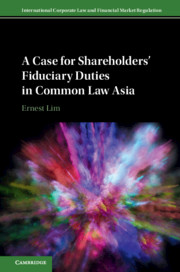Book contents
- Reviews
- A Case for Shareholders’ Fiduciary Duties in Common Law Asia
- International Corporate Law and Financial Market Regulation
- A Case for Shareholders’ Fiduciary Duties in Common Law Asia
- Copyright page
- Dedication
- Contents
- Figures
- Tables
- Acknowledgements
- Cases
- Legislation and Regulations
- Abbreviations
- Part I Introduction and Overview
- Part II Role of General Meeting and Shareholders
- 3 Powers, Shareholders and Justifications for Duties
- I. Formal Power: Voting
- II. Informal Power: Influence
- I. The General Meeting As a Co-Agent of the Company
- III. Interests of the Company
- I. Strategies for Regulating Extractions of Private Benefits of Control by Controlling Shareholders
- II. Conflicts of Interest and Extractions of Private Benefits of Control Not Regulated by the Law
- III. Justifications for Imposing Fiduciary Duties on Directors Should Also Apply to Controlling Shareholders
- I. Importance of Institutional Shareholders
- II. Reasons for Having the Codes and Their Objectives/Goals
- III. Problems with Achieving the Codes’ Key Objective
- IV. Solutions to the Problems
- I. Comparative Law
- II. US Law
- III. German Law
- 3A Formal and Informal Power: Voting and Influence
- 3B Agency and the Interests of the Company
- 3C Controlling Shareholders
- 3D Institutional Shareholders
- 3E Comparative Law
- 3F Conclusion
- 4 Objections
- Part III The Mechanics of Imposing Duties
- Part IV Enforcement
- Part V Conclusion
- Book part
- Bibliography
- Index
3D - Institutional Shareholders
from 3 - Powers, Shareholders and Justifications for Duties
Published online by Cambridge University Press: 26 July 2019
- Reviews
- A Case for Shareholders’ Fiduciary Duties in Common Law Asia
- International Corporate Law and Financial Market Regulation
- A Case for Shareholders’ Fiduciary Duties in Common Law Asia
- Copyright page
- Dedication
- Contents
- Figures
- Tables
- Acknowledgements
- Cases
- Legislation and Regulations
- Abbreviations
- Part I Introduction and Overview
- Part II Role of General Meeting and Shareholders
- 3 Powers, Shareholders and Justifications for Duties
- I. Formal Power: Voting
- II. Informal Power: Influence
- I. The General Meeting As a Co-Agent of the Company
- III. Interests of the Company
- I. Strategies for Regulating Extractions of Private Benefits of Control by Controlling Shareholders
- II. Conflicts of Interest and Extractions of Private Benefits of Control Not Regulated by the Law
- III. Justifications for Imposing Fiduciary Duties on Directors Should Also Apply to Controlling Shareholders
- I. Importance of Institutional Shareholders
- II. Reasons for Having the Codes and Their Objectives/Goals
- III. Problems with Achieving the Codes’ Key Objective
- IV. Solutions to the Problems
- I. Comparative Law
- II. US Law
- III. German Law
- 3A Formal and Informal Power: Voting and Influence
- 3B Agency and the Interests of the Company
- 3C Controlling Shareholders
- 3D Institutional Shareholders
- 3E Comparative Law
- 3F Conclusion
- 4 Objections
- Part III The Mechanics of Imposing Duties
- Part IV Enforcement
- Part V Conclusion
- Book part
- Bibliography
- Index
Summary
I argue that institutional shareholders should be required to act in good faith in the best interests of the company and to avoid unauthorised conflicts of interest. And I argue that they should be subject to the duty to disclose their voting policies and records.
Keywords
- Type
- Chapter
- Information
- A Case for Shareholders' Fiduciary Duties in Common Law Asia , pp. 273 - 317Publisher: Cambridge University PressPrint publication year: 2019

